An essay on the understanding of money
This is my philosophy about money. I have spent the last 5 years thinking about money and tried to understand what it is. This is so far as i have got ... but first some basics.
Understanding concepts
A concept is a mental description of an instance of a repeatable pattern in reality.
A tree is a concept for a certain plant, with certain features which are each also concepts and a tree is combined from DIFFERENT concepts. Twig, trunk, root, leaf etc.
For the record. A description like forest is not a concept, but an aggregation of IDENTICAL concepts. Most notably differentiated by the involved concepts NOT (necessarily) being in contact with each other - hence the use of the term "aggregation". I might add that aggregated descriptions of people are used to invoke the notion of collectivism. Collectivism is a vital illusion, necessary to make an individual willing to hand over his sovereignty to an arbitrary authority, like the state (society), a priest (faithful) or a parent (family).
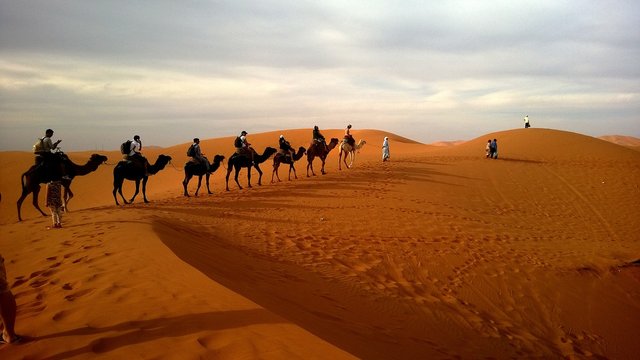
Money as it is seen now
Now let us look at the different basic representations in the real world that is usually mentioned in connection with the concept of money
- paper note
- coin
- digital number
The paper note is just as it says a piece of paper. It has some dye on it placed in a certain pattern. But so does a lot of other pieces of paper, but they are not called money. So either both are money or neither of them are.
The coin is a small flat disc made of some kind metal or mix there of. But other items made the same way is used, and not called money. So either they are both money or neither of them.
Digital numbers are converted representations of magnetic markings on a metal disc of some kind. So one could argue that it is akin to a coin. But other identical markings on a disc exist that are not called money, so either both are money or neither are.
So logically none of the physical representations are money, since we cannot have contradictions about the understanding of the same concept.
And basically what this converges towards is - that no physical object is money.
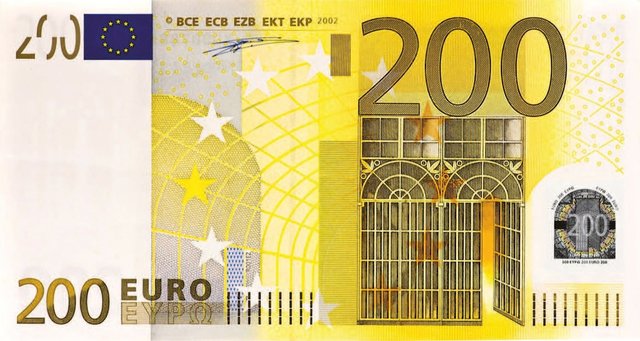
The common property
Are there any similarities between the physical representations? Yes, they come with numbers attached. Now numbers do not exist in reality but are concepts. They represent repeatable patterns or amounts, like apples for instance. Apple is a pattern that repeats and numbers are conceptualized to help us quantify nature.
Now what do these "money"-numbers represent in the real world if anything? They represent an amount of debt !
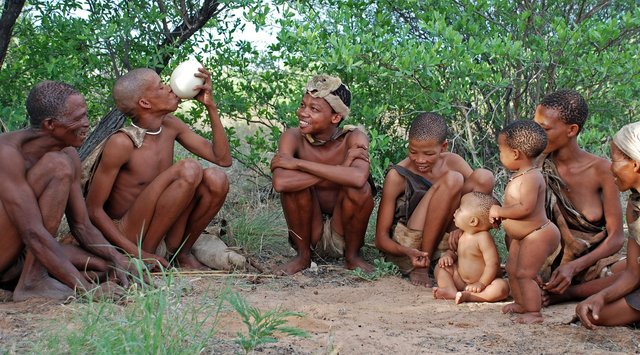
Let us go back in time
If we go back in time we get closer and closer to a point when each individual human being lived at subsistence level. By that i mean they consumed everything they produced (gathered, killed etc.). At some point one human must have found he/she had an extraordinarily skill for producing some particular good that other people also desire. So we potentially get an overproduction af that certain good if the producer does not consume it. But then what can he then use it for. Well, trade it with another human being who is extraordinarily good at producing some other product that he desires. If they are both interested in each others item, at that exact time and in sufficient amounts, they can swap .. and thereby BOTH end up the richer, because they used their own extraordinary skill to get hold of something else they could not get a hold of - unless someone else with other extraordinary skills, overproduced this item.
The problem is that, it is very nearly impossible to find someone who wants your excess produce, at that exact time, at that place and that amount, while that other person is interested in what you can supply at that exact time, place and amount (that would be sufficient for a trade).
So many trades will not occur, because one of the two parts in a potential trade, does not exist at that exact time and place (or maybe amount).
The unlikely theory of mixed commodity based mediums of exchange
Now this is where the usual theory of "money" states that "some" medium of exchange was used. Meaning that the part that could supply a good but not receive anything in exchange, would just take some other commodity that he knew that some third party would need but also have som produce that was needed. I find this extremely unlikely. Why would you take an item you did not need and then hope that some third party would be able to make a trade with something you needed at some unknown point in the future. This would be a great risk for the one holding the "medium of exchange".
Let us say that person A makes spears and B makes milk. B wants a spear but A has enough milk. B has nothing else to trade with so would he accept milk as "payment" and then hope that some person C, D, .... would need milk at the time that A would need an item from C,D... Milk is not very durable, but then what about a spear? If A is not a spear maker, then he would not have the same credibility for trading than the actual maker of the spear. And what about amounts for trade? He could not trade half a spear and so on. Highly unlikely that these basic goods would be used for intermediate trades.
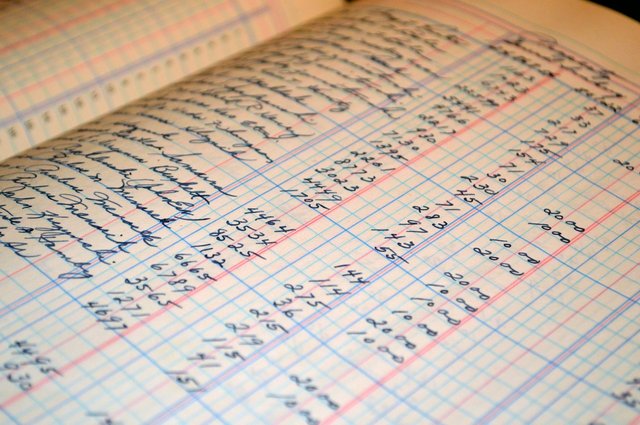
My idea of "accounting" as money
To me it is much more likely that traders would make an accounting of debt. It is known that in Mesopotamia (Hammurabi) that debt was "created" for peasants during bad harvests.
My idea is basically. "OK, i do not need you milk right now, but you can have the spear now and when i need milk i will tell you and you will deliver the agreed amount of milk to me at that point". This created a specific 1 to 1 debt, a very basic form of accounting. If traders became bigger they would need to make records of the debts they were owed. It is not likely the the debter would make accounting, because he could always hope that the other guy died, forgot or something else so he would not need to pay his debt. The creditor had a much bigger incentive for keeping track of what he is owed.
This, my speculated situation, creates a scenario where all sorts of items are debt´ed left and right and accounting makes sure that everything is remembered. Now this is a very important point. Because what this can illustrate is that money is actually the various 1 to 1 debts between traders where one of the participants could not get his item. BUT then IF every one of these "unfinished" trades were finished, all debt would be eliminated. Therefore, there would be NO MONEY at that point ... because everyone had exactly what they needed. This is basically the Utopian free market. The one that gives everyone exactly what they want at exactly that place, time and amount. At that point, money is unnecessary and worthless. So at the extreme ends of an economy money is not needed and this is also an indication that money does not "exist" .. it is a concept, namely the concept of accounting of unfinished trades.
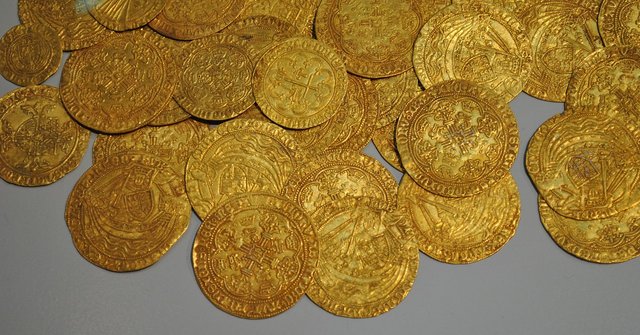
Mediums of exchange would be slowly start to be used of course when accounting was unavailable or the traders would not meet again and slowly the medium would converge towards the good that best functioned that way. This turned out to be gold. traders knew that this was the most liquid good, it was very scarce and therefore easy to carry large values on your person and also hide it. It could be divided and smelted back together without too much effort and therefore very tradable with all kinds of other goods. These qualities i suppose were generally preferred by travellers and they would create a demand also for stationary traders and slowly gold (and silver and other metals usually), would start to serve as an "accounting" for debt.
The permanent debt idea
Now here is an insight that occurred to me a year ago. When everyone starts to use a commodity as accounting AND it is the same commodity everywhere (not the variated 1:1 debts i mentioned before) suddenly this commodity (gold) becomes permanent debt. It is no longer restricted to "you owe me some milk for that spear and our debt will be eliminated when the milk is delivered". All gold is accepted as a tradable good for any other good and the debt that it represents is NEVER eliminated. It has become un-eliminatable PERMANENT DEBT.
Now that transition from 1:1 debts into permanent debt is the key to understanding why money is so hard to get a grasp on. It feels like gold (at least until 45 years ago) was some magical substance that was placed here to be "used as" money. Therefore the difficulty in comprehending money as something else than a physical thing.
But gold is actually not worth anything with regards to money .. if you are on a deserted island alone you have no use for it. When hyperinflation hit Germany, people could not get rid of money fast enough (that is why it is called "hyper").
So in a sense the commodity (paper, coin, digital numbers) is a game of musical chairs. People do not really want the commodity that represents money (the debt they are owed), but the commodities they can exchange it to. It just brings place, time and amount together at any time you need it to.
But still. Money is "just" an accounting system of debt, and the debt has become interchangeable and permanent because of the use of a single commodity to represent the debt.
Now the end point of this is ...
It is because money is an accounting system of permanent debt, that crypto currencies are the closest we have yet come to perfect money
And it is portable, divisible, fungible .... etc ... but furthermore it is transmittable over long distances in an instant. It is impossible to counterfeit (not the case with fiat money) and so on. Crypto currencies, like BitCoin and Steem, are a giant improvements of "money" .. and it is going to make the old "accounting system" obsolete.
Thank you for reading :-) ... let me know what you think about my thoughts !
Cryptocurrency, and physcal silver and gold
It is all about figuring out what people think will be a store of value after the SHTF :-)
And diamonds!
They are not good as physical representations of money, but they are great stores of value i believe. Tho im no expert :-)
Trustworthiness: Build trust with pet owners through reliability and good care.
Flexibility: Offer flexible scheduling to accommodate different needs.
Experience: Highlight any previous experience with animals. bitcoin casino instant withdrawal
I think that this article is a great analytical piece and it was quite interesting for me to read it, however (and apologies for being blunt) I disagree with many points above, especially the last part. For example, gold was money, it started being percieved as a commodity after 1980's... and the same money as a "permanent debt" is a temporary phenomemon started massively growing only after 60-80's of last century. There is a whole set of reasons why it can be permanent and should be finished quite soon in fact..... probably even next year.....
Have you read David Graber? He's got a 500 page book on debt and debt-money.
https://www.amazon.com/Debt-First-5-000-Years/dp/1612191290
Why buy; when you can pirate it?
https://www.google.com/url?sa=t&source=web&rct=j&url=https://libcom.org/files/__Debt__The_First_5_000_Years.pdf&ved=0ahUKEwjvrs3-lJ3PAhXC1B4KHZy5Dw0QFggeMAE&usg=AFQjCNH9cswktcqfRf7UWCNNNJNrcH-VNA&sig2=d4I5GHSUWpmItXvtC5ZEBg
I would say I am against the Adam Smith barter idea, which is basically what my post is about.
My interest from Graeber's book is his idea that Adam Smith had it all wrong. As you can read here.....
http://www.theatlantic.com/business/archive/2016/02/barter-society-myth/471051/
And compare it to this pro Adam Smith article here......
http://www.alt-m.org/2016/03/15/myth-myth-barter/
Who do you think is right? Please anyone jump right in.
I am against the Adam Smith barter idea, which is basically what my post is about.
Hi, no i have not read it. I was not aware of it. I am more like a down to basics and philosophize from scratch :-)
Like your mind.
Crypto currency will help many to not sit with debt in the future.
To me, anything that facilitate the exchange of goods or services without having to barter trade can be seen as some form of money.
So a shopping basket can be seen as money?
well, if someone take you shopping basket and use it to trade with another for something else, then it is. :-) Otherwise, if he keeps the shopping basket, it's barter trade.
Money and currency are two different things. Not everything can be money but I suppose a shopping basket could be seen as a currency.
Sorry @ace108 .. maybe i was a bit sarcastic and twisting your words. You can see money anyway you like, i am argueing philosophically towards a rational and logic explanation of money. Facilitating a trade is not reduced only to within the concept of money. A lot of things has to be in place before a trade can happen and before money is even "on the table".
But to evaluate on the physical representation of money. Whatever good, we use as a token of money, is the token of money, it is not money, that would be the concept of accounted debt. Anything can IN PRINCIPLE work as physical tokens for money, it is just that goods have different characteristics and thus different degrees of usefulness.
You could make a top 100 of goods in a "useful as money" review, just like a review of like Anti virus softwares where you have like 10 attributes (divisibility, fungibility, portability,..etc)
and then rate them on a scale like the reactivity series ...
then you would get the same thing just with a series for money ... and cryptos would be way ahead of gold. Actually new attributes would be needed that was not even in our minds before the invention
https://en.wikipedia.org/wiki/Reactivity_series
Can this be seen through smart contracts?
If i have a smart contract with some entity and i desire a burger. Does that burger appear in that instant?
I agree with you wholly! I loved your article, you're pretty smart :) I'm just learning about cryptocurrencies and it's pretty exciting. You laid it out very well, how money is not a REAL thing. Thanks for taking the time to write.
Thank you very much. I am glad that my ideas come across as feasible. I think i have got close to the truth :-)
These are great opportunities to get more benefits and profits. And I've been looking for alternative solutions for making money, and online casinos seem to me a profitable option. I always consider the most generous slots when choosing online casinos. And this source was just a godsend for me https://sizzlinghotspot.com/ggbet/ Review with great deals help me choose the option that suits me.